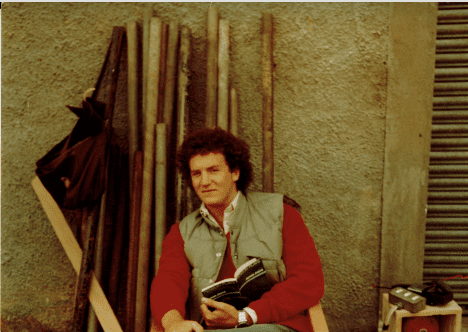
Welcome to the second issue of A RABBIT’S FOOT, film, art, culture and confessions.
Much has happened since our first issue launch at the Cannes Film Festival in May. Since going digital in July, we have started taking subscriptions to our website. The site allows you to read the printed version of the magazine online, as well as accessing the updates carousel where we curate a selection of films playing in the cities our small team is able to cover—and any cultural events we believe you might be interested in. We will also launch our shop this month, where you can buy hard copies of the book and prints from the celebrated photographers featured in print. I am also happy to announce A RABBIT’S FOOT is selling both in selected stores and newsagents in London, and will soon be available in New York and Los Angeles and Paris.
In this issue, we bring our focus to Italian cinema: both of the past and the present. Italy has always been a filmmaker’s haven, a place where film and filmmakers are uniquely celebrated and encouraged. The term ‘Maestro’ is applied to directors as reverentially as it is to orchestra conductors, and in Roma, the Eternal City, Cinecittà remains one of the great studios of Europe.
That Italian cinema is in the midst of a creative boom, a revival of the film community unseen since the fifties and sixties, is without question. In contemporary film, the Roma based Neapolitan Paolo Sorrentino, the master filmmaker whose magnificent Il divo, La grande bellezza and last years The Hand of God, stand out on the global stage, leads as an emblem of the reinvigoration of Italian cinema. With him are the brilliant Luca Guadagnino, Nanni Moretti, Giuseppe Tornatore, and a new wave of female filmmakers: Valeria Golino, Valeria Tedeschi Bruni, Ginevra Elkann, and Alice Rohrwacher. In addition to these directors, you will discover up-and-coming artists in our Manifesto section, as well as profiles on actors.
We hold a special respect at A RABBIT’S FOOT for the Italian ‘auteur’ filmmakers who write and direct often uniquely personal stories, which over the decades have fascinated and inspired global audiences. The likes of Rossellini, Pontecorvo, De Sica, and of course Fellini, need little or no introduction to those of us who love cinema, but they are joined today by a nouvelle-vague of writers, directors and actors who are making a global mark and bringing Italian cinema and culture to the forefront. If we look at the Italian cineaste body-of-work over the past decades, we have to compel those of you who have not seen Fellini’s 8 ½ and La Dolce Vita, Rossellini’s Rome, Open City, De Sica’s Marriage, Italian Style or Bertolucci’s The Conformist, Sergio Leone’s Once Upon a Time in America, to watch and savor these films. As you discover the work of their contemporary counterparts, you will see the clear evolution of the filmic voice of this ancient culture.
The Venice Film Festival—under the watchful eye of Alberto Barbera—is also going through a revival, perhaps encouraged by the Venice Biennale, which has enjoyed spectacular success this past decade. At the film festival this year, international masters including Alejandro Iñárritu, Todd Field, Darren Aronofsky, Luca Guadagnino, Martin McDonagh, Florian Zeller and Noah Baumbach, are among the filmmakers in competition.
As a lover of Italy, and of all things Italian, it was completely impossible not to touch on other aspects of Italian culture in this issue. We are privileged to feature stories on Francesco Clemente, the great contemporary artist, and Alba Clemente, his wife: the enchanting performer and writer. We are also lucky to have interviewed Francesco Vezzoli, whose own startling paintings and sculptures rest hand-in-hand with contemporary filmmakers of his generation. Lisa Immordino Vreeland, who directed Peggy Guggenheim: Art Addict, returns to her subject in our art and culture pages. Alain Elkann talks of his meeting Fellini and shares his interview with Monica Vitti, who passed away this year, and who we celebrate on our cover. Natasha A. Fraser, our gal in Paris, interviews Chiara Mastroianni in a moving and deeply personal ode to her father Marcello. Natasha also explores the world of Carlo Ponti and Sophia Loren. Jason Solomons joins us again to explore Morricone, the man and his music…Peregrine Kitchener-Fellowes tackles Visconti…Mark Cousins explores Pasolini, and Peter Bradshaw illuminates De Sica.
Venice can’t be Venice without the Arrivabene family, and my lively and most talented deputy Chris Cotonou interviewed the clan in one gaggle. Other pieces—and there are many—will, I hope, bring you a glorious prism of Italian film culture and style.
My special thanks, as ever, to Chanel for their support, as well as our new advertisers Moncler, Hermès, and 101 Studios. A special mention to Ralph Boon for building our website and giving A RABBIT’S FOOT its online home.
We are a small team over here in the Rabbits warren and our journey is young (and not without challenges) but we are truly enthusiastic and most definitely excited to be still going!
Special thanks to our creative director Tristram, to Fatima, our art director and style contributor, to Anna, our ever-reliable editorial coordinator, and to Luke, our online and go-to-man for whatever needs doing. Also to Julien Planté, our commissioning editor. To Chris, my deputy, I owe my thanks and a good suit.



